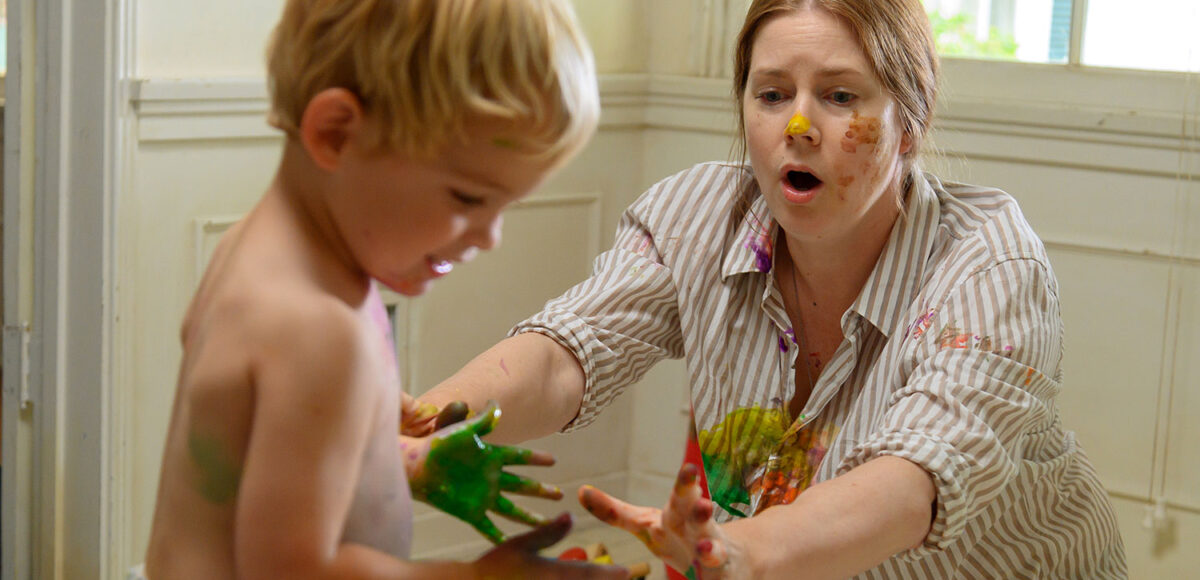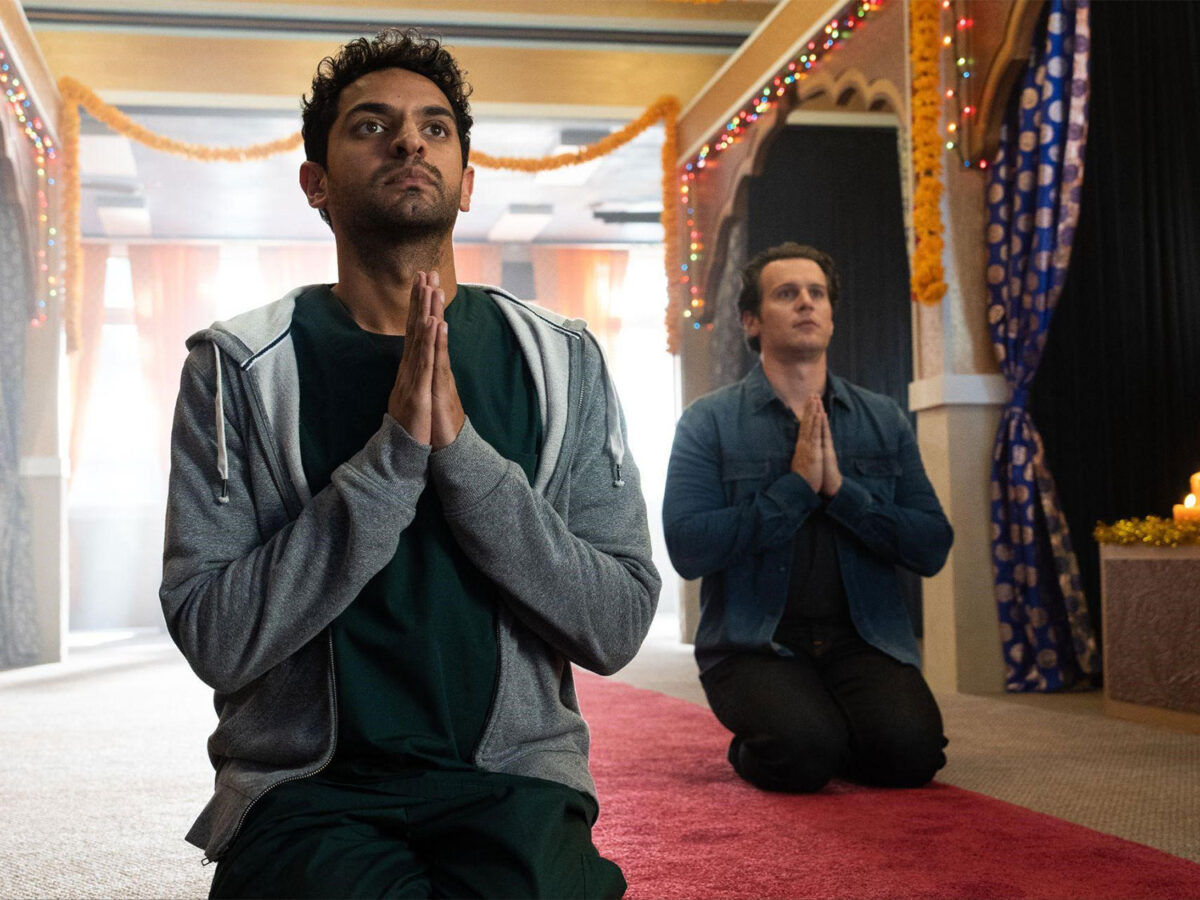Marielle Heller has written and directed an adaptation of Rachel Yoder’s bestseller to extraordinary effect. Complex in subject matter, complicated in action and brilliant in execution, this searingly conflicted portrait of motherhood will not be for everyone, but it definitely was for me. In an embrace of universality, her main characters are simply named Mother, Father and Son.
Mother had been a rising artist and gallerist, but when she had her baby she hopped on the stay-at-home bandwagon when she had trouble managing both, something that was eagerly embraced by Husband. Son, now 2 years old, is an adorable munchkin whose moments of temper are rare and to be expected. Children hate to go to sleep, especially when Mother and Father have blurred the lines of independence, allowing him to sleep with them. Father is engrossed in a job that often takes him out of town, so almost all the heavy lifting is left to Mother. She does everything the books say the perfect mother should do. Their routine is jam-packed with trips to the playground, walks in the park, baby yoga and book babies with other moms. But this life is starting to close in on her, and her dreams become nightmares where she becomes a canine predator, losing her human appearance and descending into a magical world where she is the leader of the pack.
Overflowing with scenes of magical realism, this sometimes grounded and sometimes bizarre tale isn’t about dogs or babies or the inability to conform. Mother has lost her identity, one that used to be tied up in the art she created and no longer has time for. It was her self-awareness as an independent woman capable of carrying on adult, multisyllabic conversations with her peers, peers she lost when she left the workforce. There is no overt blame anywhere, but that doesn’t mean that Mother isn’t profoundly affected by the unspoken. Her artist cohorts have left her behind, not understanding why she can’t do both. The other moms she meets seem supremely happy and satisfied in their stay-at-home roles, so reminiscent of the competitive games played by others. “My child slept through the night immediately.” “My child was speaking in complete sentences at nine months.” “How many words in his vocabulary?” Truly, this competition is real. Think back. Only perspective or the realization that everyone lies will keep you grounded.
Father is confused by the unrelenting sadness of Mother. After all, it was she who chose this path. His mother and grandmother were both stay-at-home moms and happy about it. Didn’t Mother’s mother stay at home? But it’s complicated. Mother knows full well that she chose this life; she knows that she willingly succumbed to motherhood over painting. But why? Where’s the time? Why is she unable to do both? Why is she having these dreams and are they more real than she’ll admit? Accompanying those animal dreams are snippets of her cloistered childhood and an inexplicably distant mother.
The layers of “Nightbitch” can be peeled in almost infinite ways. Superficially, this is a horror story of a woman becoming a predatory animal, menacing those she should be loving. Dig a little deeper and it is an exquisite portrait of a woman descending into the madness of dissatisfaction caused by postpartum depression, one felt by far too many. Why can’t she do it all? Why can’t she have it all? Society reveres the stay-at-home mom as a one-size-fits-all. Wisely, “Nightbitch” is not casting blame, only introspection. That Mother feels she is failing because she is unfulfilled in this role makes it so much sadder that she recognizes that Son is wonderful. She loves him unconditionally; it’s herself that she doesn’t love.
What Heller has given us is a very nuanced view of postpartum depression, an illness suffered by many and recognized by too few. Postpartum changes the brain chemistry, which may be miring her in a vicious circle of self-loathing and hallucinations. Her hormones are unchecked and may be leading to actual body changes, perhaps not into a dog, but it might account for the growth of external hair and soft tissue tenderness, hair color or sexual drive (positive and/or negative); or not. Mother, in her own eyes, was a someone but now she is only an appendage to Son and Father. Where is she? Why can’t she enjoy this stage of her life, one that she deliberately chose? Or did she? Did her mother, long dead, suffer as she does? Her mother gave up a flourishing singing career to raise her children in a restrictive religious environment. Why didn’t Mother recognize her mother’s pain? Why hasn’t she thought of her mother in years?
Everyone reacts to motherhood differently, something that Mother doesn’t recognize. Spiritual and psychological needs are not one-size-fits-all. When there are no overt villains in her pain, she turns inward, blaming herself.
There are so many moments of joy that serve to underscore Mother’s unhappiness. Son is a delight and a pleasure; the other moms find her interesting. Descending into the madness of her nightmares is frightening. A gentle dog becomes a killer.
Selling such a surreal take on motherhood and the real depression faced by so many lands squarely in the lap of the extraordinary star, Amy Adams. Adams, a six-time Academy Award nominee, has amazing range, constantly pulling the viewer into her madness that is in direct opposition to the loving mother she tries so hard to be. Always unsettling, she has put a face on this depression that is seemingly shameful—the inability to glory in the raising of another human being. Funny, sad, depressing, dissatisfied, happy, with a self-awareness that leads directly into self-hate, these are aspects of Mother’s personality and life that Adams conveys convincingly.
Scoot McNairy is Husband, the loving yet clueless mate whose confusion heightens his complicity in his wife’s depression as well as his earnest desire to “fix things.” He is as necessarily sympathetic as he is blind to her needs.
The other women that fill the screen add to the complexity of Mother’s dissatisfaction. Foremost among them is Jessica Harper, the librarian, who is both real and a figment of Mother’s imagination, pulling her into her dreams. Kerry O’Malley plays Mother’s mother with grace and ambiguity.
Cinematographer Brandon Trust perfectly captures the night scenes that blur into the surreal.
Complicated, complex, obtuse, ambiguous, “Nightbitch” is all of these and more. Heller has found all the colors, depth and character development that make this an extraordinary experience and a probable Oscar contender.
Opening Dec. 6 at the AMC Century City 15.
Neely Swanson spent most of her professional career in the television industry, almost all of it working for David E. Kelley. In her last full-time position as Executive Vice President of Development, she reviewed writer submissions and targeted content for adaptation. As she has often said, she did book reports for a living. For several years she was a freelance writer for “Written By,” the magazine of the WGA West, and was adjunct faculty at USC in the writing division of the School of Cinematic Arts. Neely has been writing film and television reviews for the “Easy Reader” for more than 10 years. Her past reviews can be read on Rotten Tomatoes where she is a tomato-approved critic.







